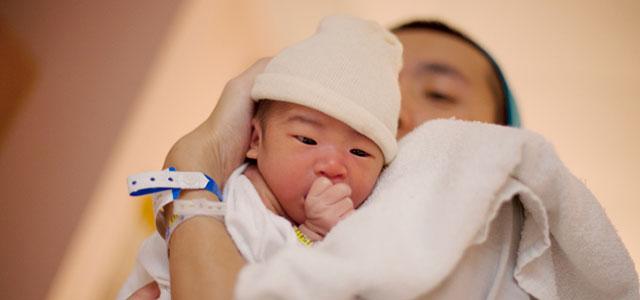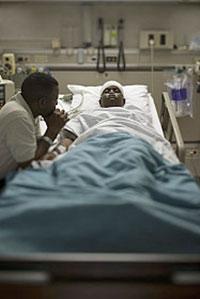
Expanding the Role of Fathers
The woman’s postpartum depression was debilitating. Her husband was worried about whether she could take care of their baby, and he didn’t know how he was going to cope, especially with her crisis forcing him into an unfamiliar role.
He realized he could no longer be a “sideline person,” as he later explained to Alyssa Abraham, a doctoral candidate at UC San Francisco School of Nursing.
“And I think that is what guys are a lot of the times,” he said. “We stand on the sidelines, and we really only help when things are needed. The mom is definitely the quarterback of everything. But you know, [the counselor] says, now you have to be more active and you have to keep an eye out.”
The man was one of the fathers Abraham interviewed for a pilot study on men’s experiences with their partner’s postpartum depression. And though the man was talking about his particular situation, his statement about fathers being “on the sidelines” speaks to a common experience men have shared with Abraham and student and faculty colleagues in the School of Nursing who are conducting wide-ranging studies on fathers’ roles in health care settings.
As these men describe it, they have found themselves relegated to supporting players in perinatal, neonatal intensive, pediatric oncology and other settings that focus on care for children.
 Betty Davies (left) and Jennifer Baird This sidelining of fathers is gaining attention in health care circles because it undermines efforts to provide “family-centered care.” Advocated by the American Academy of Pediatrics, this concept holds that the needs of an entire family should be addressed when one member is facing a health crisis. Moreover, both parents should be partners with doctors, nurses and other professionals: sharing information and deciding as a team the best course of treatment, particularly in the cases of children who face complex chronic illnesses or life-limiting conditions.
Betty Davies (left) and Jennifer Baird This sidelining of fathers is gaining attention in health care circles because it undermines efforts to provide “family-centered care.” Advocated by the American Academy of Pediatrics, this concept holds that the needs of an entire family should be addressed when one member is facing a health crisis. Moreover, both parents should be partners with doctors, nurses and other professionals: sharing information and deciding as a team the best course of treatment, particularly in the cases of children who face complex chronic illnesses or life-limiting conditions.
“Family-centered care is a common catchphrase,” says Betty Davies, a professor emerita in the School’s Department of Family Health Care Nursing and a senior scholar at the University of Victoria, in Canada. She is also an internationally renowned expert on death, dying and bereavement. Davies, along with research colleague Maria Gudmundsdottir, a nurse at Marin County-based Hospice by the Bay, welcomed UCSF School of Nursing doctoral candidate Jennifer Baird in her studies on the father’s role in pediatric palliative care. “Everyone talks about [family-centered care], but people really don’t do it well or often. It’s not just focusing on the person who is ill but looking at the whole family as a unit,” says Davies.
Dads Dismissed
When Abraham and Baird started their doctoral studies in 2008, they wanted to apply the family-centered approach to their respective specialties. Abraham’s aim was to develop therapeutic interventions to help families cope with a mother’s postpartum depression. Baird came from a background in pediatric intensive care and pediatric oncology nursing; she would join Davies in her studies on fathers in palliative care. What they realized was that fathers’ perspectives were largely absent from the literature.
In Baird’s specialty, “unfortunately, but not surprisingly,” most of the data come from mothers. To some extent, the reasons are logistical. Mothers are usually the ones who accompany children to medical appointments or stay with them in the hospital. Fathers often continue working or may need to look after other children at home. Their hospital visits may be limited to evenings or weekends, often when leading members of a child’s health care team are off duty.
When it comes to postpartum depression, the focus is almost solely on mothers and their needs. Guidelines on managing a new mother’s postpartum depression (such as those from the Association of Women’s Health, Obstetric and Neonatal Nurses, or AWHONN) make little or no mention of addressing or supporting the father, Abraham says. This is the case despite emerging research showing that a woman’s postpartum depression crisis can seriously affect her partner’s mental health. “In pediatrics and perinatal care, for decades we were celebrating motherhood and the idea of the infant-mother dyad,” Abraham adds.
Moreover, in public health circles, fathers are sometimes regarded as problems that need to be dealt with. They are the absentee dads, Abraham says, or the “partners not paying child support.”
This is especially true of young men of color, says Janelle Palacios (see sidebar). She focused on early childbearing among Native American women for her School of Nursing doctorate but subsequently interviewed teen fathers about their experiences. When these fathers took their paternal duties seriously, they had to overcome pervasive stereotypes that could hinder their ability to be part of their children’s lives: “These fathers could be discounted from the family picture, especially by health care providers, who may see the young woman who comes to her prenatal appointment, not realizing there is a father who is trying to be involved,” says Palacios.
Postpartum Depression: Not for Women Only
That involvement has health care implications. In the past few years, for example, a growing body of research shows that postpartum depression is not a female-only phenomenon. A 2010 analysis published in the Journal of the American Medical Association found that 1 in 10 fathers experienced sadness after the birth of their child and were at risk for depression when their baby was 3 to 6 months old. Other studies estimate that half of men whose partners have postpartum depression will become depressed themselves.
Abraham’s interviews with fathers for her pilot study were “eye-opening.” She interviewed four men, ages 23 to 40, whose wives had been diagnosed with postpartum depression. “None of the dads had been diagnosed with anything, but in listening to them, some of these dads sounded like they might be struggling, too,” she says.
For her dissertation, Abraham looked deeper into how a mother’s postpartum depression affects couples’ relationships. The 10 couples faced stressors common to all new parents: sleep deprivation, demands of breastfeeding, financial concerns, decline of sexual intimacy, and what happens when one of the partners – usually the father – returns to work. But with the mother in the throes of a mental health crisis, those stressors could seem insurmountable.
While none of the fathers worried their wives would hurt the babies, they were afraid their wives would leave. It was also agonizing to see their once happy, healthy wives unable to get out of bed, or to hear them say they didn’t know how to love their babies. Other men felt hostage to “emotional terrorists” – wives who would obsess over small details of the baby’s care and lash out when things weren’t done just right.
Recommended treatments for the mothers’ depression added new conflicts. Certain antidepressants are not supposed to be taken while breastfeeding, so when physicians recommended these medications, couples wrestled with the breastfeeding decision. “I can’t say she has to do it, or stop doing it,” one father said of breastfeeding. “In my heart I wish we could keep doing it, but I want them to do what’s best for her.”
Physicians also told these mothers to get a full night’s sleep – a recommendation that left fathers to take over the middle-of-the-night feedings. After night after night of interrupted sleep, fathers still had to put in a full day’s work. “Three of the dads moved into the nursery, and one of the dads slept on a mattress [on the floor] for two months,” Abraham said.
Keeping It Together
The fathers interviewed by Abraham, as well as by Davies and Baird, were willing to help all they could with child care but felt duty-bound to return to work. They also felt it was their role to put on a brave face.
“As much as we like to say we’re a modern society, many men still hold onto deep-rooted ideas that they are supposed to provide for their families,” Abraham says.
The men in Davies’ study struggled to keep it together at work and in front of family and friends, while swallowing their own sadness about their child’s declining health. “The exhaustion involved in that effort could be overwhelming,” Baird said.
Yet among the men Abraham interviewed, some found it a relief to be able to finally vent about their situation. One father talked about how hard it was to return to his high-stress job while worrying about his wife back at home. On his first day back at work, he said, his wife called and asked him to come home. “She didn’t think she could make it through the day without me. I reminded her that her mother was there to help, and she said she needed me. I was so pissed. I know it sounds terrible, but I was,” he said.
When Fathers Know Best
 For their study (as yet unpublished), “Fathers’ Experience with End-of-Life Care,” Davies’ research team gathered stories from fathers about health care teams doing excellent work in pediatric palliative care. They hoped fathers would provide unique insights into why these teams were successful.
For their study (as yet unpublished), “Fathers’ Experience with End-of-Life Care,” Davies’ research team gathered stories from fathers about health care teams doing excellent work in pediatric palliative care. They hoped fathers would provide unique insights into why these teams were successful.
They interviewed 60 fathers whose children had died three months to three years prior to the study in four different settings, including a regular hospital and a pediatric hospice. These fathers, from diverse backgrounds and with ages ranging from 24 to 60, said they appreciated professionals who dispensed with the traditional doctor-patient relationship, as well as nurses and doctors who actively listened and responded to questions.
“Acting graciously with parents facilitated the sharing of ideas, questions, concerns and information. To fathers, such behavior demonstrated respect, sensitivity and compassion,” Davies and Baird wrote.
Baird also said fathers liked it when health care teams treated them as equals and valued their expertise in how their children would respond to particular treatments. And sometimes a father’s close involvement helped avoid serious errors, “as in the case of a father who kept meticulous notes and was therefore able to catch an overdose of chemotherapy before it was administered,” Baird and Davies wrote.
Most of all, fathers wanted regular and honest assessments of their child’s prognosis, even if they heard bad news. One father expressed gratitude for how his son’s doctors and nurses helped his family decide when to end life support and suggested comforting ways to say good-bye: “And luckily [the nurse] said, ‘Bring your friends and family in to say good-bye,’” the father recalled. “And we got to sleep with him overnight and…basically they pulled the feeding tube and he just had a slow morphine drip, and…I know the nurse did the best she could to make him feel comfortable.”
The Future of Family-Centered Care
Davies, Baird and Abraham hope their research adds to growing scholarship that will help children and families benefit when health care providers encourage and allow fathers to be involved.
For her part, Abraham hopes her research shows that a safe and happy home for babies and young children begins with parents who are both physically and psychologically healthy. The mothers and fathers she interviewed all said they would have benefited from prenatal education that went beyond childbirth classes and featured “real-life lessons” about how a new baby would radically transform their lives.
“They feel well prepared for what their experiences in the hospital will be like, but not as well prepared for how their relationship with each other and their identity as a couple – and as individuals – will change.” With growing awareness of depression among new fathers, Abraham would also like to see well-baby appointments include check-ins not just with mothers about how they are doing, but with fathers as well.
Baird agrees that the family-centered care must include a distinct focus on fathers’ needs and concerns. Whether a man is adjusting to life with a new baby or coping with his child’s illness and death, he is not a supporting player – neither in his child’s life nor in his family’s.
Davies says: “It is increasingly recognized that fathers play a critical role in shaping how families raise and care for their children, not only when they are healthy, but especially when they are seriously ill. Watching a child fall sick and die is a crisis for all family members, including fathers, who, along with mothers and siblings, struggle to explain and make sense of this experience.”



